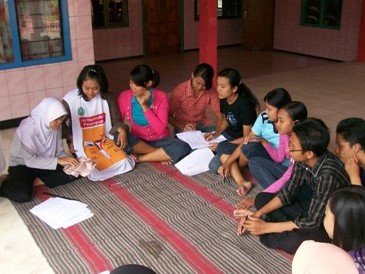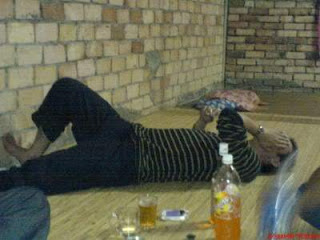[ Youth Reproductive Health Programs ]

Topics Reproductive Health Programs Adolescents are a topic that needs to be known by the community, especially teenagers so they have the correct information about the reproduction process and various factors that exist around it. With the right information, it is expected that adolescents have a responsible attitude and behavior regarding the reproductive process. In this case adolescent reproductive health is a healthy condition concerning system, function and process of reproduction owned by adolescent. The notion of healthy here does not merely mean disease-free or free from disability but also mentally and socially cultural.
This Youth Health Program Information will also provide information services on Adolescent Health conducted by the government or organized by non-government institutions and its implementation among the community, especially teenagers.
[ Youth Reproductive Health ]

While reproductive health according to WHO is a physical, mental and social condition intact, not only free from disease or disability in all aspects related to the reproductive system, its functions and processes.
The definition of reproductive health according to the 1994 ICPD results in Cairo is a perfect state of physical, mental and social well-being and not merely the absence of disease or weakness, in all matters relating to the reproductive system and its functions and processes.
This definition of reproductive health includes the following: 1) The right of a person to obtain a safe and satisfying sexual life and having the capacity to reproduce; 2) The freedom to decide when or how much to do; 3) The right of men and women to obtain information and obtain a safe, effective, affordable accessory both economically and culturally; 4) The right to obtain adequate levels of health services so that women have the opportunity to undergo the process of pregnancy safely.
Youth Reproductive Health
Broadly speaking can be grouped four groups of factors that could adversely affect health repoduksi namely:
Socio-economic and demographic factors (especially poverty, low levels of education, and ignorance of sexual development and reproductive processes, as well as remote residential locations).
Cultural and environmental factors (eg, traditional practices that have an adverse impact on reproductive health, the beliefs of many children, the information about reproductive functions that confuse children and adolescents as opposed to each other, etc.).
Psychological factors (impact on adolescent fractures in adolescents, depression due to hormonal imbalances, women's unworthiness in men who buy their material freedom, etc.).
Biological factors (birth defects, defects in the reproductive tract post sexually transmitted diseases, etc.).
So glimpse of adolescent reproductive health, hopefully increase our knowledge.
How to Overcome Juvenile Delinquency
Adolescence is closely related and often associated with the name of juvenile delinquency. Adolescence in general is a transitional shift from childhood to adolescence. Actually juvenile delinquency arises from the inability of children in the face of the task of adolescent development that must be met.
In adolescence a lot of changes that occur in the child, both psychological and physical aspects. In terms of psychic physiological theories of development that expose disharmony, emotional disturbance and behavioral disturbance as a result of the pressures experienced by adolescents because of changes that occur in itself and due to changes in the environment. If not wary, psychological changes that occur as a task of adolescent development will have a negative impact on adolescents. For teen development tasks can see here
Problems arising when not fulfilling the task of adolescent development
According Hurlock (1973) there are some problems experienced by adolescents in fulfilling these tasks, namely:
Personal problems, ie issues related to situations and conditions at home, school, physical condition, appearance, emotion, social adjustment, duties and values.
Typical adolescent problems, that are issues arising from unclear status in adolescents, such as the problem of achieving independence, misunderstanding or judgment based on false stereotypes, the presence of greater rights and fewer duties imposed by parents.
Today's teenagers have a lot of pressures that they get, ranging from the development of physiology, coupled with the environmental and socio-cultural conditions and rapid technological developments. This can lead to the emergence of psychological problems of self-adjustment disorder or behavior that results in a form of behavioral disorder called juvenile delinquency.
In my opinion, the pressures that arise from the environment and parents who want children to perform adult roles, when they are still classified in adolescence, psychologically the child has not been able to deal with it. Stress, sadness, anxiety, loneliness, adolescent self-doubt makes them risk taking juvenile delinquency (Fuhrmann, 1990).

Family (household)
The results of several studies indicate that children / adolescents raised in poor family social environment or family disharmony, then the risk of children to experience personality disorder become antisocial personality and deviant behavior greater than children raised in healthy or harmonious family (sakinah) .
School
Bad school conditions can disrupt the learning process of students, which in turn can provide "opportunities" in students to behave deviant. For example, the often changing school curriculum, the lack of religious content / character. In this case the most important role is the teachers of religion, teachers PKN and Counseling Guidance, although all elements of the school is responsible for the behavior of children in school.
- Community Conditions (Social Environment)
Unfavorable environmental factors or "vulnerable" social conditions, is a conducive factor for children / adolescents to behave deviant. Healthy environmental factors for example: this can be divided into 2 parts, namely first, the community vulnerability and second, the factor of vulnerability (disorder kamtibmas). The criteria of both factors are:
Community Vulnerability Factors (Environment)
The entertainment venues are open late into the night even until the early hours
Circulation of alcohol, narcotics, other illegal drugs
Unemployment
Children drop out / street children
Prostitute woman (wts)
The circulation of reading, spectacle, TV, Magazines, and others that are pornographic and violent
Slum and dense housing
Environmental pollution
Violence and crime
Social gap
Prone Areas (Kantibmas Disorders)
Abuse of alcohol, narcotics and other additives
Individual or group / mass fights
Speeding
Theft, robbery, mugging, composting, robbery
Rape
Murder
Other violent acts
Destruction
Scribble and others
Psychosocial conditions like this, is a factor that is conducive (vulnerable) for the happening of juvenile delinquency.
How to Overcome Juvenile Delinquency
Adolescence as a period is a period that is full of changes and vulnerable to the emergence of problems (juvenile delinquency). Therefore, the need for special attention and good understanding and proper handling of adolescents is an important factor for the success of adolescents in the next life, considering this period is the most decisive.
In addition, there needs to be cooperation from the teenagers themselves, parents, teachers and other relevant parties so that the development of adolescents in the field of education and other areas can be directed, healthy and happy. So little exposure on how to deal with juvenile delinquency, may juvenile delinquency in this country is reduced
Teenagers have a great sense of curiosity and tend to want to explore the world. Often the desire to explore all these things is not accompanied by careful consideration, until sometimes the actions are high risk both for yourself, others, and the environment around him. If left unattended and left unattended, these risks can create problems.
Reproductive health is often misunderstood narrowly as sexual relations only, so many parents feel that the topic of conversation is inappropriate for talks with teenagers. In fact, reproductive health is a state of physical, mental, and social health is very important to be understood by teenagers, so it is not merely discussing about sexual relationships.

Puberty makes teens aware of their potential and becomes more expressive in exploring their organs and sexual behavior. Perceptions about reproductive health and false sexuality may be brought into their sexual behavior.
For sexually active adolescents, these misconceptions can increase risky sexual behavior and lead to the risk of sexually transmitted diseases. The disease can be whitish, Chlamydia, Gonorrhea, to HIV Aids. If left unchecked, the disease may lead to further infection and harm itself.
In fact, many teenagers are afraid to talk about reproductive health problems with parents in shame, fear of being scolded or punished. Many teenagers do not know that they are exposed to reproductive health diseases, but are reluctant to check them into health facilities.
Adolescents who have reproductive health diseases should be immediately taken to a health facility for treatment. Health workers will also provide information so that bad behavior related to reproductive health will change.
Parents have a very important role in the lives of adolescents, so parents need to be more intensive in inculcating good moral values to adolescents, one of them by explaining the loss of premarital sexual relations from all sides, from the potential diseases that can be transmitted from risky sexual behavior, to the consequences of mental and financial unpreparedness in starting a home life due to unplanned pregnancy.
It would be better if the education is given with the principle of affection and openness, so that adolescents will be more comfortable and open themselves in talking about reproductive health issues. An anti-reproductive attitudes about reproductive health and sexuality will not help your children better understand the risks that can result from this misconception.
To be able to provide information on reproductive health effectively, parents need to filter out sources of information so that the knowledge provided to the teenagers is accurate and does not cause excessive worry in adolescents. Be a companion familiar to them, so they can comfortably ask these questions about reproductive health. Thus, you can get closer to the children, and they will feel that their parents are cool because they are open to discussing things that are considered taboo.